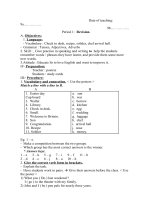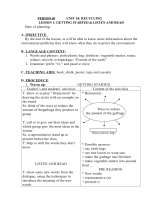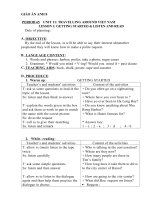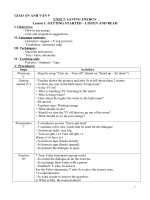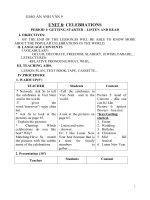Giáo án tiếng anh 9 Học kì II (Unit 9)
Bạn đang xem bản rút gọn của tài liệu. Xem và tải ngay bản đầy đủ của tài liệu tại đây (159.42 KB, 20 trang )
UNIT 9: NATURAL DISASTERS
I. AIM:
Helping students:
- To make predictions
- To tall about the weather forecast
- To describe events
- To write a story
II. LANGUAGE FOCUS:
1. Relative pronoun: who – that – which
2. Relative Clauses (defining and non defining)
III. VOCABULARY:
VERB ADJECTIVES NOUNS
(To) behave abrupt battery temperature
(to) border extensive bureau thunderstorm
(to) collapse tidal carriage tide
(to) destroy coast typhoon
(to) erupt damage volcano
(to) expect earthquake volume
(to) lift flashlight disaster
(to) trust forecast
(to) warm Funnel
Highlands
Pacific Rim
IV. UNIT ALLOCATION:
Lesson 1 (2) Listen and Read Reading a dialogue for details about the weather
forecast and completing the information.
Lesson 2 (3) Speak Practicing speaking about what to prepare for a
typhoon
Lesson 3 (1) Before you read
(5) Read
Reading a text about natural disasters for details.
Lesson 4 (6) Write Writing a story about a typhoon
Lesson 5 (4) Listen
Language Focus 1 – 2
Listening for details to complete a table and
Further Practice in Relative pronouns: Who-
which –that.
Lesson 6 Language Focus 3 – 4 Further Practice in defining Relative clauses and
non defining Relative clauses.
1
UNIT 9: NATURAL DISASTERS
Lesson 1: Section: - Listen and read (page 74 – 75)
Period 56:
1Aim: reading a dialogue for details about the weather forecast.
• Objective: By the end the lesson, students will be able to get the information about
weather from the weather forecast.
• Teaching aids: Text books, picture.
PROCEDUCE
Stage Steps/ Activities Work
arrangement
Warm-Up
Pre reading
* Chatting:
- Ask students some questions about weather
• What’s the weather like today?
• Do you like hot/clog water?
• Have you ever listened to the weather forecast on the radio
or on TV?
• Do you think weather forecast is useful for us? How is it
useful?
II. Pre-teach vocabulary:
- turn up (v): điều chỉnh to lên (âm thanh TV, radio). (mime)
- expect (v): mong đợi, chờ đón (translation)
- thunderstorm (n): bão có sấm sét, mưa to (picture)
- delta (n): vùng châu thổ (visual)
- just in case (n): phòng khi, lỡ khi (translation)
- trust (v): tin tưởng, tin là thật (synonym: rely on)
* Checking vocabulary: what and where
- Have students repeat the words chorally then rub out word but
leave the circles. Remember to let students repeat before and after
rubbing out each word.
- Go on until students can remember the words.
- Get students to write the words again in the correct circles.
II. Pre-questions:
- Set the scene: Thuy is talking to her grandmother while they
both are watching TV
- Give students one question and ask them to guess the answer
a. What are they watching?
- Give feedback
T-whole class
T-whole class
Pair work
2
Expect
Thunderstor
m
Delta
Trust
Turn
off
Just in case
While
reading
Post reading
Homework
* Answer keys:
a. They are watching the weather forecast on TV
I. Gap filling:
- Have students read the dialogue silently and do exercise 2b on
page 75.
- Get them to share their answers with their partners.
- Give feedback
* Answer keys:
1. Thuy’s grandmother wants her to turn up the volume on TV
because she wants to listen to the weather forecast
2. The coast of Thanh Hoa will be raining.
3. The central highlands will experience thunderstorms.
4. Ho Chi Minh City will have temperature between 27
0
C and
35
0
C
5. Although Thuy’s grandmother doesn’t trust weather forecast
she like watching them.
II. Comprehension questions:
1. Why does Thuy’s grandmother ask her to turn up the volume?
- Because she wants to listen to the weather forecast
2. Which City is the hottest today?
- Ho Chi Minh City in the hottest
3. Where is Thuy going?
- She going on to the part on the other side of Thang Long Bridge
with her old friends (she’s going on the picnic)
4. What does Thuy grandmother want her to do?
- She wants her to bring along a raincoat.
- Have students practice asking and answering in pairs.
III. Practice the dialogue
- Let students listen to the dialogue and focus on the
pronunciation.
- Call on some students to play the roles of Thuy, grandmother
and weatherman to practice the dialogue.
- Ask students to practice the dialogue in group of three
* Speaking:
- Ask students to read again the weather forecast on TV and
notice some phrases.
Will have temperature
Between …………and……………………
* will experience temperature
Between …………and……………………
* HCM’ temperature will be
Between …………and……………………
* can expect clouds / thunderstorm.
- Ask students to look at the map and play the role of the
weatherman to present the weather forecast, baked on the
information given.
- Call on some students to present before the class
- Have students work in pairs – one students speaks, the other
Individual
work
Pair work
Pair work
Group work
3
listens.
- Ask students to write a weather forecast. The dialogue will help
them. Students can change the information, the places…
4
UNIT 9: NATURAL DISASTERS
Lesson 2: Section: - Listen and read (page 76 – 77)
Period 57:
• Aim: practice speaking about preparations for a typhoon.
• Objective: By the end the lesson, students will be able to talk about what they want to
buy and do to prepare for a typhoon.
• Teaching aids: Text books, posters.
PROCEDUCE
Stage Steps/ Activities Work
arrangement
Warm –up
Presentation
* Brainstorming:
- Have students think about what they do to prepare for a typhoon
- Have students to go to the board and write down
Buy food
Store water
* Possible answers:
+ Check the doors and the windows.
+ Cut some branches of high tree in the garden or around the
house
+ Buy oil, gas
+ buy candles
+ Check the roof
I. Pre-teach vocabulary
- bucket (n): cái sô (visual)
- leak (n): chỗ thủng, chỗ dột (visual)
- tie (v): cột, trói (mime)
- latch (n): cái chốt cửa (picture)
- ladder (n) : cái thang (picture)
- blanket (n) : cái mền (picture)
- available (adj) : có sẵn (translation)
- damage (v): phá hỏng, làm thiệt hại (synonym of hurt or spoil)
* Checking vocabulary: Slap the board
- Write the Vietnamese translation all over the board
T- whole class
T- whole class
5
Preparation for A
typhoon
Phá hỏng
Cái thang
Cột trói
Cái chốt cửa
Có sẵn
Chỗ thủng
Cái mền
Practice
- Call on two students or 2 teams of 4/5 students to the front of
the class
- Call out English works and two students run forward to slap the
Vietnamese word on the blackboard. The students slapping the
correct word first gets one mark.
II. Revision:
* Form:
must
nay + infinitive
* Use: in deduction or prediction
* Practice:
the water pipe may be damaged
There be must strong wind blowing
* Possible answers:
- There may be a power cut
- There must be heavy rain
- Big trees may fall down.
- The market may be closed
- There may be a flood
- ……………………………
- Have students to exercise 3a on page 76. The students have to
check () what preparations they think should be done for a
typhoon.
*Answer keys:
Buying some canned food
Painting the house
Buying a dog
Buying candles
Buying marches
Hiring some video movies
Filling all buckets with water
Buying a ladder
Washing your blankets
Fixing the leak in the roof
Tying the roof to the ground with pegs and ropes.
Inviting some friends over for a dinner
Checking all the window and a door latches
T- whole class
Pair work
Pair work
6
What happens if there
is a typhoon?
Production
Homework
- Elicit some questions and get students to ask and answer in
pairs.
a. Why do we need to buy food?
( Because the market will be cooled and no food will be
available)
b. What food do we need to buy?
(rice, oil, canned food, soy sauce, flour,…)
c. Why do we need to buy candles?
( Because there may be power cut)
d. Why do need to fill all buckets with water?
(Because water pipes may be damaged and we’ll not have enough
water to use right after the typhoon)
e. Why do need to buy a ladder?
( Because the roof may be damaged by the typhoon, and we have
to fix it)
f. Why do we need to the check all the window and door latches?
(Just in case the strong wind pushes the doors open)
- Ask students to use the expressions on page 77 when talking to
one another.
* I think …
* I think you should…
* Yes, I think so …
* What for?
* ………
- Divide the students into the group of four.
- Have students talk about what they think they want to buy and
to do prepare a typhoon; explain why. They can you the questions
and the answers above. Besides, the ideas in the bubbles on page
77 can help students talk easily.
- Go around and help students. Encourage students to show their
own ideas.
- Write something about what they have to do to prepare for a
typhoon.
Group work
Individual
work
7

